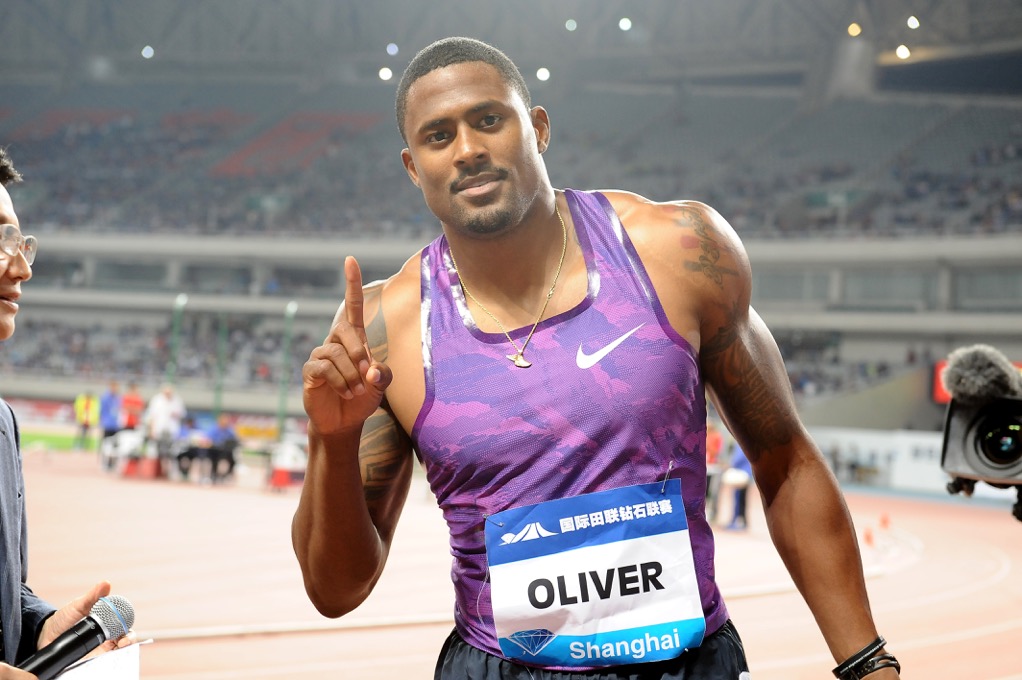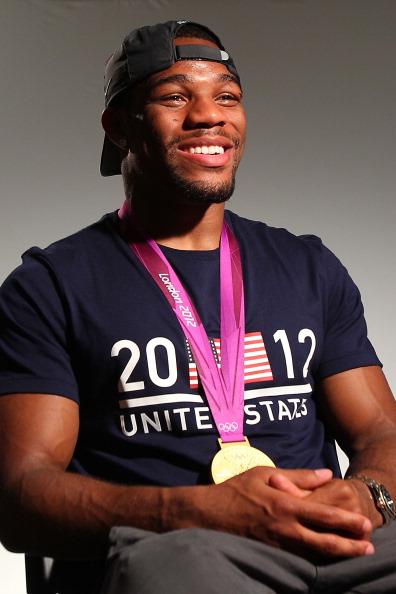In December, 2004, David Oliver, just 22, graduated from Howard University, a star in football and track. He moved the very next month to Florida, intent on becoming a star on the professional track circuit, and started working with coach Brooks Johnson. Oliver is now 33, the 2008 Beijing Games bronze medalist in the 110-meter high hurdles, the 2013 world champion. He is a father, a family man. He is the same guy and yet very different from that 22-year-old. “I do owe the man a ton of credit,” Oliver said. “I learned everything from him.”
This was after David Oliver fired Brooks Johnson — in response to a profanity-laced text message Johnson had sent after Oliver’s run Saturday at the Prefontaine Classic in Eugene, Oregon.
Oliver ran a hugely respectable race in Eugene, finishing third in 13.14. Pascal Martinot-Lagard of France, 23, a rising star who last July in Monaco ran a 12.95, won the race, in 13.06. Aries Merritt, the 2012 London Games gold medalist and current world record holder, finished second, in 13.12.
Some more context: Oliver has the fourth-fastest 110 hurdles time ever, 12.89, run in his magical 2010 season, when — fully healthy — he was unbeaten in 15 finals races and held the top five times in the world. Merritt’s world record: 12.80, run in 2012.
Oliver has long been active in USA Track & Field’s volunteer programs with kids. He consistently has been straightforward in defeat and humble in victory.
Johnson has for decades been one of the most recognizable figures within the U.S. track and field scene. In training, he runs what generously has been described as a “benevolent dictatorship.”
After receiving Johnson’s text, Oliver weighed what to do. In a telephone interview Tuesday, he said he decided he would let matters sit for 24 hours while he thought about things. He stayed that Saturday night in Eugene. The next day, while on a layover in San Francisco, “nothing [had] changed” in his mind, so he “broke out my phone” and wrote an email in response; then, including Johnson’s original text in quotes, he sent that email to a number of key associates.
That email has since circulated in track and field circles.
Both Johnson’s text message, and Oliver’s email response, are reprinted in their entirety below. As Oliver put it, that way there can be “no confusion and no one will be able to put any spin on what went down and my integrity would not be impugned by anyone involved to say I did something disrespectful or no one understands why this happened or anything like that.
“I want it laid out specifically so that this is exactly why I can no longer work in this kind of environment. I am 33 years old, I have my own family and I will not tolerate having people talk to me or addressing me with disrespect. That’s the thing that is my message.”
Johnson, when reached by telephone, and informed it was a reporter calling — after having previously been sent a two-part text message inquiring about the Oliver email — said, “So?”
Asked on the phone about the email, he said, “That was supposed to be a private exchange and as far as I’m concerned it’s still a private exchange.”
Asked then why he wrote Oliver the text message in the first instance, he said, “It’s none of your damn business.”
When asked if further questions would be helpful, Johnson said, “I’m not motivated to diminish athletes. Any defense I might make to what has happened might diminish him. That was never my motivation.”
Here, then, is the Oliver email in full — again, beginning with Johnson’s text message included in quotes. Recipients’ names have been removed.
From: David Oliver
Date: May 31, 2015 at 4:28:08 PM EDT
To:
Subject: Re: Coach's Comments
This is a message I received from Brooks after the race in Pre:
"Lets make sure we understand each other. You are making the very same mistakes of judgement and discipline that all the others before you have made by allowing off the track shit to take away and distract from the total focus and concentration needed to be at your very best on the track. Between your fucking agent and your inability to say "no" you are going to piss away an Olympic gold and a lot of excellence,success and $$$$ in between. If you are that needy that you will exchange bullshit for performance then let me be the first to tell you that you are well on your way to succeeding in creating your own diminishment."
This is the text message that I received from you, two minutes after I saw you face to face and you had nothing to say. Aside from displaying a level of cowardice, it is also beyond disrespectful. Clearly, what I feel the level of respect that should exist is not a two way street and only existed in my mind. Since text messaging/emailing complaints and grievances is your favored way of problem solving, I will reciprocate.
Not sure what your initial thoughts were, but I guess you call yourself taking issue with my attending my best friends wedding before the competition (7 full days before). I would totally be on board with your message had I shown up to the competition the day before and went out and ran 13.40 and embarrassed myself. Was the race at Pre perfect? Of course not, but it was my fastest run since the finals at Worlds in 2013. You seemed to gloss over that fact, as well as the fact that I've run incrementally faster every time I have stepped on the track this season. So if I ran 13.07 and won Pre instead of 13.14, would your message be the same? Seven-hundredths of a second really set that off?
Also, not sure what my managers had to do with your rant, but at the end of the day, you, along with them, work for me, not the other way around. Everyone is suppose to be a part of my team, trying to help me get to where I'm trying to go. In no other business setting would your message to me been viewed as acceptable. I guess you are still mistaking me for the 22 year old, wide eyed kid with barely any life experiences you first met. Like you say when its convenient for you "you either adapt, or become extinct like the dinosaurs", you clearly have failed to adapt to the fact that I do not need you, at 33 years of age, as much as you need me. When I finally woke up to that fact fall of 2012 and started doing what I felt I needed to do when it came to training and doing things on my own (which I've continued doing since) I found myself right back where I was suppose to be, instead of running backwards like I was doing 2011/2012 had a stuck to your gym/track program exclusively.
I have always been loyal and have glossed over so much disrespect from you in the past, rather it be in Monaco in 08, Tiff has us nearly missing our flight to Beijing, but "Tiff can do whatever she wants, she has a better chance of meddling than you do" or in 2011 at dinner with a table full of people, night before racing in Zagreb, unprovoked and inside your feelings about something, silencing the table with a "that's why Richardson's whipping your ass now" barb. I was on the verge of saying right back "or maybe you're just being out coached by John Smith" but that would have been very disrespectful and unprofessional. I could go on and on. I have always let all that type of stuff roll like water off a ducks back, but the unmitigated gall you had to type out that message to me, especially since I was just face to face with you, was the last straw.
Your theme for me this year seems to be you're "witnessing a lot of competitive leakage" (whatever that means), well let me be honest, I have witnessed the steady decline and "training leakage" in your program for quite a while. I have my training logs to validate that fact. We use to be proactive, aggressive and have a clear cut plan of attack for every week. Now, it's reactive (somebody start is off in a race, all we will do is starts in training all week), passive (somebody gets hurt in a sprint workout, we won't sprint for months, yet we are all SPRINT HURDLERS. Back in the day if you got hurt, the workout continued and you just jogged miles on the track til you came back healthy). I was nearly 31 years old before I started getting a day off from training, now 24 year old athletes who need to be honing their craft are taking days off. The program has gone soft and is fostering soft minded athletes. I am tired of asking and hinting at trying to do the workouts that I know were key in my development. Why was a couple months ago the first time we marked off the 16 hurdle workout, although the new track has been in place since Jan '13? Competitive race model? 45s down the track? Mock event workout? Trust I was still getting those done, just on my own. In my estimation, you have gone from a coach who was deeply passionate about the development of athletes, to one just happy to collect checks. No disrespect intended, but I'm just being a "brutally honest mirror"
I am not interested in stress/drama/negativity at this point in my career, so as you always say, "you're either part of the problem, or part of the solution" you have become part of the problem. You also say "it is your own career" and since I seem to be all of a sudden becoming "a needy athlete well on my way to succeeding in creating my own diminishment", I will do so on my own terms.
I would not be where I am in my career/life if it were not for the ten years I spent under your tutelage and that fact can not and will not ever be diminished. Just like every relationship doesn't end in marriage, we have closed the last chapter in this coach/pupil relationship. Thank you for everything and much continued success.
David Oliver






